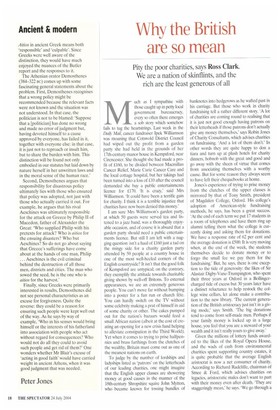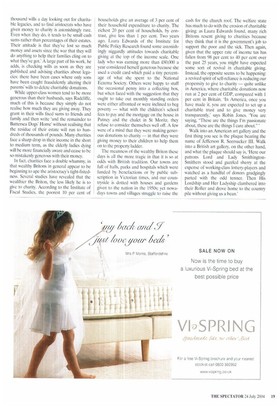Why the British are so mean
Pity the poor charities, says Ross Clark We are a nation of skinflints, and the rich are the least generous of all
Much as I sympathise with those caught up in petty local government bureaucracy, every so often there emerges a sob story which somehow fails to tug the heartstrings. Last week in the Daily Mail, cancer fundraiser Ipek Williamson was moaning that Cotswold District Council had wiped out the profit from a garden party she had held in the grounds of her 17th-century manor house in Kempsford, near Cirencester. She thought she had made a profit of £160, to be divided between Macmillan Cancer Relief, Marie Curie Cancer Care and the local cottage hospital, hut her takings had been turned into a loss of £10 after the council demanded she buy a public entertainments licence for £170. 'It is crazy,' said Mrs Williamson. 'It could have been a terrific gain for charity. I think it is a terrible injustice that charities have now been denied this money.'
I am sure Mrs Williamson's garden party, at which 50 guests were served tea and listened to a jazz band, was a thoroughly enjoyable occasion, and of course it is absurd that a garden party should need a public entertainments licence. But still I am left with a nagging question: isn't a haul of £160 just a tad on the mingy side for a charity garden party attended by 50 people at a country house in one of the most well-heeled corners of the English countryside? It isn't that the good folk of Kempsford are untypical; on the contrary, they exemplify the attitude towards charitable giving shown by well-off Britons. To external appearances, we are an extremely generous people. You can't move far without bumping into a poster for a fun run or church fete. You can hardly switch on the TV without some celebrity making a prat of himself in aid of some charity or other. The cakes pumped out for the nation's bazaars would feed a small African nation (albeit at the cost of creating an opening for a new crisis fund helping to alleviate constipation in the Third World). Yet when it comes to trying to prise halfpennies and brass farthings from the clutches of the wealthy, Britain must come out as one of the meanest nations on earth.
To judge by the number of lordships and ladyships listed as 'patrons' on the letterheads of our leading charities, one might imagine that the English upper classes are showering money at good causes in the manner of the 18th-century Shropshire squire John Mytton, who became known for tossing bundles of banknotes into hedgerows as he wafted past in his carriage. But those who work in charity fundraising tell a rather different story. 'A lot of charities are coming round to realising that it is just not good enough having patrons on their letterheads if those patrons don't actually give any money themselves,' says Robin Jones of Charity Consultants, which advises charities on fundraising. 'And a lot of them don't.' In other words they are quite happy to don a tiara and turn up at plush hotels for charity dinners, hobnob with the great and good and go away with the sheen of virtue that comes from associating themselves with a worthy cause. But for some reason they always seem to have left their chequebooks at home.
Jones's experience of trying to prise money from the clutches of the upper classes is mirrored by that of Tony Smith, president of Magdalen College, Oxford. His college's adoption of American-style fundraising methods, he says, has been a great success, 'At the end of each term we put 17 students in a room of telephones and have them ring up alumni telling them what the college is currently doing and asking them for donations. We have a response rate of 62 per cent and the average donation is £500. It is very moving when, at the end of the week, the students themselves decide to donate money or to forgo the small fee we pay them for the fundraising.' But, he says, there is one exception to the tide of generosity: the likes of Sir Alastair Digby-Vane-Trumpington, who spent their three years at Oxford in a Bollingercharged tide of excess but 30 years later have a distinct reluctance to help restock the college wine cellars, let alone make a contribution to the new library. 'The current generation of the British aristocracy just isn't in a giving mode,' says Smith. 'The big donations tend to come from self-made men. Perhaps if your family money is locked up in a large house, you feel that you are a steward of your wealth and it isn't really yours to give away.'
Given the millions of lottery funds awarded to the likes of the Royal Opera House, and the wads of cash from environmental charities spent supporting country estates, it is quite probable that the average English aristocrat is now a net consumer of charity. According to Richard Radcliffe, chairman of Smee & Ford, which advises charities on legacies, aristocratic males don't want to part with their money even after death. 'They are staggeringly mean,' he says. 'We go through a thousand wills a day looking out for charitable legacies, and to find aristocrats who have given money to charity is astonishingly rare. Even when they do, it tends to be small cash sums rather than percentages of their estates. Their attitude is that they've lost so much money and assets since the war that they will do anything to help their families cling on to what they've got.' A large part of his work, he adds, is checking wills as soon as they are published and advising charities about legacies: there have been cases where only sons have been caught fraudulently altering their parents' wills to delete charitable donations.
While upper-class women tend to be more generous than their husbands, says Radcliffe, much of this is because they simply do not realise how much they are giving away. They grant in their wills fixed sums to friends and family and then write 'and the remainder to Battersea Dogs' Home' without realising that the residue of their estate will run to hundreds of thousands of pounds. Many charities face a sharp drop in their income in the short to medium term, as the elderly ladies dying will be more financially aware and cease to be so mistakenly generous with their money.
In fact, charities face a double whammy, in that wealthy Britons in general appear to be beginning to ape the aristocracy's tight-fistedness. Several studies have revealed that the wealthier the Briton, the less likely he is to give to charity. According to the Institute of Fiscal Studies, the poorest 10 per cent of households give an average of 3 per cent of their household expenditure to charity. The richest 20 per cent of households, by contrast, give less than 1 per cent. Two years ago. Laura Edwards of the Institute for Public Policy Research found some astonishingly niggardly attitudes towards charitable giving at the top of the income scale. One lady who was earning more than £80,000 a year considered herself generous because she used a credit card which paid a tiny percentage of what she spent to the National Eczema Society. Others were happy to stuff the occasional penny into a collecting box, but when faced with the suggestion that they ought to take out monthly standing orders were either affronted or were inclined to beg poverty — what with the children's school fees to pay and the mortgage on the house in Putney and the chalet in St Moritz, they refuse to consider themselves well off. A few were of a mind that they were making generous donations to charity — in that they were giving money to their children to help them on to the property ladder.
The meanness of the wealthy Briton these days is all the more tragic in that it is so at odds with British tradition. Our towns are full of halls, parks and hospitals which were funded by benefactions or by public subscription in Victorian times, and our countryside is dotted with houses and gardens given to the nation in the 1950s; yet nowadays towns and villages struggle to raise the cash for the church roof. The welfare state has much to do with the erosion of charitable giving: as Laura Edwards found, many rich Britons resent giving to charities because they think that it is the government's job to support the poor and the sick. Then again, given that the upper rate of income tax has fallen from 98 per cent to 40 per cent over the past 25 years, you might have expected some sort of revival in charitable giving. Instead, the opposite seems to be happening: a revived spirit of self-reliance is reducing our propensity to give to charity — quite unlike in America, where charitable donations now run at 2 per cent of GDP, compared with 1 per cent in Britain. 'In America, once you have made it, you are expected to set up a charitable trust and to give money very transparently,' says Robin Jones. 'You are saying, "These are the things I'm passionate about, these are the things I care about."' Walk into an American art gallery and the first thing you see is the plaque bearing the name of Jefferson R. Seersucker III. Walk into a British art gallery, on the other hand, and what the plaque should say is, 'Here our patrons Lord and Lady SmithingtonSmithers stood and guzzled sherry at the expense of working-class lottery-players and watched as a handful of donors grudgingly parted with the odd tenner. Then His Lordship and Her Ladyship clambered into their Roller and drove home to the country pile without giving us a bean.'



























































 Previous page
Previous page